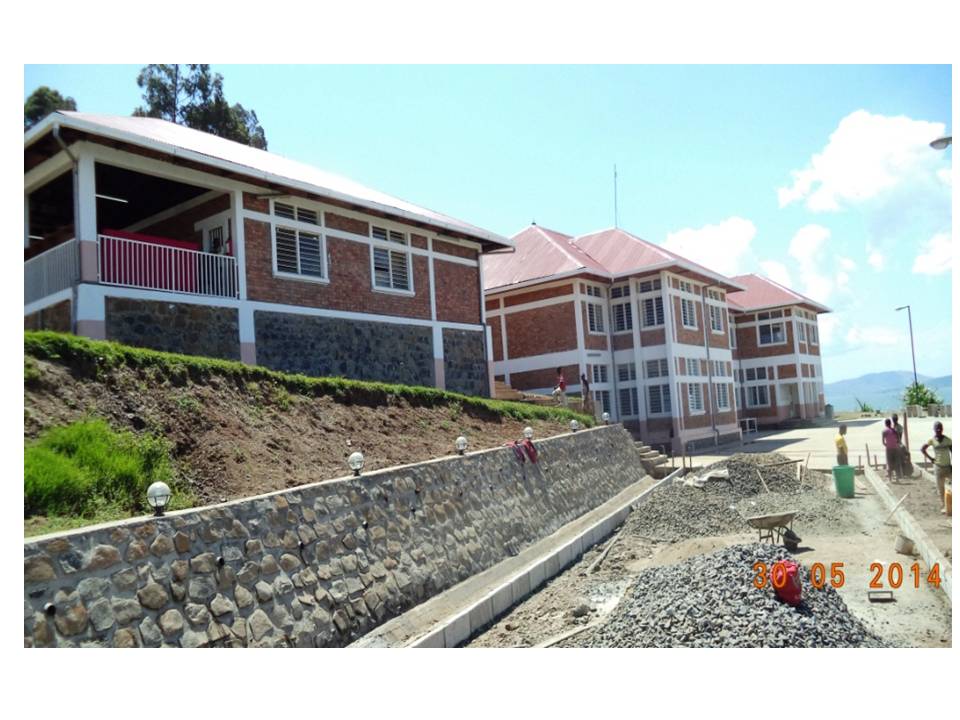IITA and partners launched a research center in Kalambo, Bukavu, South Kivu province in Eastern Democratic Republic of Congo (DRC) yesterday (5 June 2014) that would deal with emerging challenges in the agricultural sector.
The DRC Minister of Agriculture and Rural Development, Hon. Jean Chrisostome Vahamuitsi, representing the DRC President, His Excellency Joseph Kabila Kabangi, commissioned the center with the Republic of Burundi’s Minister of Agriculture and Livestock, Her Excellency Odette Kayitesi, in an event that was attended by more than 200 stakeholders consisting of policy makers, representatives of the donor community, development practitioners, partners, researchers, private sector representatives, and farmers from within and outside of the country.
The IITA Kalambo research center includes a state-of-the-art laboratory, machine fabrication shop, and crop processing and training facilities that would support agricultural development in the country and the Central Africa region as a whole. It was constructed with partial support from the African Development Bank-funded project called Support to Agricultural Research for Development of Strategic Crops (SARD-SC).
During the launch, the DRC Agriculture Minister expressed his government’s happiness in hosting the IITA research center in South Kivu.
“We welcome this research center in our midst and are happy to host and support a facility that would help build the capacity of researchers and farmers in DRC and the region. Such a facility would help the country and the region as a whole in addressing pressing agricultural challenges that prevent the production of more food for the region’s teeming populations.”
In a press briefing held earlier in Bukavu, the South Kivu Governor Marcellin Cishambo said that “agriculture is the most important sector in DRC, providing 42% of the country’s GDP and employing over half of the population.”
“However, out of our 80 million hectares of potential agricultural land, only approximately 10% is being used,” he said. “The government is therefore very keen to develop this sector to diversify and catalyze the overall economic development of the country.”
Also during the press briefing IITA Director General Dr Nteranya Sanginga noted that the Central Africa region would become an important bread basket for the continent by tackling some of the problems of smallholder farmers in the region through research.
“With this new center, together with our partners in the region, we are now better equipped to handle the existing and the new emerging challenges to agriculture through research,” Dr Sanginga said. “Research alongside education is one of the most important investments in any country seeking socioeconomic transformation.”
Also speaking at the press briefing, the IITA Director for Central Africa, Dr Bernard Vanlauwe, said: “We are working with farmers to increase their agricultural production on the same piece of land to reduce and ensure food security for densely populated areas and reduce the deforestation in forested areas. This is through introducing smart farming practices―including use of high-yielding improved varieties and better farming practices including soil fertility management.”
The launch program included a tour of the facilities and an exhibition of products and research outputs by researchers and agricultural entrepreneurs (“agripreneurs”) from IITA’s Central Africa hub and stations. Scientists and young researchers talked about their work on the following research themes: tackling pests and diseases; increasing productivity; improving nutrition; adding value; and other initiatives that included ongoing work on biocontrol, natural resources management, and “agripreneurship”.
Last year, IITA had launched a similar facility in its eastern Africa office in Dar es Salaam, Tanzania; and laid the foundation stone for its facility in Southern Africa in Lusaka, Zambia. The construction of science and training centers in the hubs are all in line with the institute’s new refreshed strategy and its vision of becoming a leading research partner facilitating solutions to hunger and poverty in Africa.

No Comments